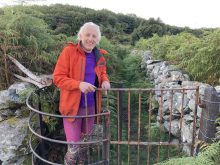 In a second interview with my co-founder of Recovery Voices, Wulf Livingston describes the national addiction recovery movement which grew up in the UK between 2008-12, and then how this initiative faded at a national level over later years. What we see today in terms of recovery is very different to what occurred at this earlier time.
In a second interview with my co-founder of Recovery Voices, Wulf Livingston describes the national addiction recovery movement which grew up in the UK between 2008-12, and then how this initiative faded at a national level over later years. What we see today in terms of recovery is very different to what occurred at this earlier time.
Wulf goes on to talk about the development of North Wales Recovery Communities (NWRC) in Bangor, North Wales, one of a number of exciting recovery community initiatives dotted around the UK, and its Founder, James Deakin. Wulf has been closely associated with James and NWRC since its development. I loved hearing about various aspects of the development and current status of this really exciting recovery initiative.

 I recently came across the following article about North Wales Recovery Communities (NWRC) from
I recently came across the following article about North Wales Recovery Communities (NWRC) from  Huseyin Djemil
Huseyin Djemil After visiting
After visiting  On Friday 23 September, I left Gower and headed to Tregarth in North Wales, via Aberystwyth and Dolgellau (where one of my ancestors was born), to stay with Wulf Livingston and his lovely wife Melanie. As I had such a tight schedule, I was due to stay there only one day, but my cousin Emma (my next visit) had just tested positive for Covid, so I ended up staying two days with Wulf and Mel.
On Friday 23 September, I left Gower and headed to Tregarth in North Wales, via Aberystwyth and Dolgellau (where one of my ancestors was born), to stay with Wulf Livingston and his lovely wife Melanie. As I had such a tight schedule, I was due to stay there only one day, but my cousin Emma (my next visit) had just tested positive for Covid, so I ended up staying two days with Wulf and Mel. After visiting my eldest daughter Annalie and family in Manchester, and seeing recovery advocates
After visiting my eldest daughter Annalie and family in Manchester, and seeing recovery advocates 
